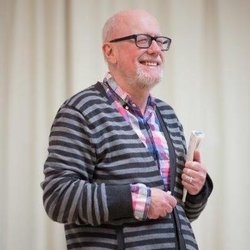Brief Encounter With … Translations' Niall Buggy
Sheffield Theatres' Brian Friel season continues with a staging of his 1980 play Translations at the Crucible Theatre. We spoke with Niall Buggy who plays Hugh in this new adaptation.

© Mark Douet
WOS: Brian Friel has said that Translations is a play that is fundamentally about language; how does it feel, as an actor, to be the carrier of that language?
NB: I don't feel it's about that at all. To me it's more about loss: how we lose things in life; how we deal with that; and how we have to face the new. And that we have to try and receive joy out of receiving the new. And how we say goodbye to the old. I think the hope of love helps us to continue and the play shows us that. I think that's why people relate to it. I don't think they relate to it because it's a play about language. I think it's a play about love and the loss of love, and finding it.
That's interesting. Perhaps the playwright is in love with the language, but the actor and the audience are more connected to the human?
Friel has said that it's also a play about loneliness. These people are fiercely alone, as we all are.
Something that's also quite present in Afterplay [now playing in the Studio].
It's in all the work, really. As indeed it is in Chekhov.
Translations has been an important work for quite a long time now; does it say something different today to when it was first written, or is it quite timeless in those themes we were just talking about?
I think it is timeless. Everyone can relate to it. What is going on in the play is what is going on in our lives. And if a playwright can achieve that in a piece of work, it means that it is shared, and I think if something is shared, it makes the load lighter, in a way, and easier to carry.
We're all going through change, but change is part of living. There is the conflict of holding on to something – because there is the loss of a language in this play, which is also the loss of a time; the loss of a period. My character, Hugh, says we must learn these new names. We must learn…
Show a willingness to move forward?
But he doesn't know if that's going to make life any better or not. And that's the turmoil, I suppose, that we all go through.
So, it's about taking a leap of faith, or an act of hope for the future?
Yes, exactly. I mean, religion or God is not mentioned in any of this work. What is mentioned and explored is what literature can do to the imagination. You have a character called Jimmy Jack who lives in the Greek and the Latin languages. That's his world and it's very real to him. He's an elderly man and he speaks Latin every day so he can indulge in this fantasy life, which literature, of course, allows us to do.
It allows us to go into another world. How necessary that is and how much of a loss it would be if we lose it… or not? Do we know? There are no answers in the play, I don't think. It is left to us that life goes on and we make of it what we can. There is also an element about respect. If people lose their respect for themselves, they lose more than that. Hugh has a wonderful line that he says to Maire at the end. He says, "I will teach you English, Maire.
I will provide you with the available words and the available grammar, but will that help you to interpret between silences?" It's an extraordinarily observant line, isn't it? For us all. You learn a new language, so you have that, but have you got the ability to live?
And that's also quite resonant in terms of what you say about Friel not attempting to answer all those questions. He asks the questions; then leaves it to the audience to interpret the silences between those questions.
And Hugh says, I have no idea, but it's all we have. And then it ends with him talking about Juno, and he starts to recite that old story about a new race of Trojans coming, and then he forgets it. He's always known that story all his life, but he loses the words, and the words lose him, at the end. It sounds a bit depressing, but it's also quite funny. There are some wonderful characters in it. Friel is brilliant at writing characters – the greatest in the world. I mean, he's the greatest living playwright, in my opinion, in the world.
And how are rehearsals going?
It's very interesting for me to be back at the Crucible theatre after over 40 years. I started off my career in England in this theatre, when I was 21. I was in the very first company. I met my very great friend Susan Wooldridge here, who was in the company also. We were all here for nine months, and we did, I don't know how many plays. Quite a few. And it was an interesting experience because, at that period in time, people in Sheffield were used to the Playhouse theatre, so this thrust stage wasn't something they had anticipated or wished to have, really. I think they're quite proud of it now.
Very much so, I think.
That's wonderful to see. It is a very exciting space. It's a very dangerous space for the actor; very exposing.
But you're happy to be back in Sheffield?
Ah yes. It became very much part of my life. The last couple of years I've been dreaming about Sheffield. I came back in 1975 to do Waiting for Godot, but that was the last time I was here: many, many years ago. And now… James Grieve is a marvellous director and it's a superb cast – a wonderful company of actors. And with Mr Friel behind us: he's a great present to an actor. He's the best present you can have.
Translations runs at the Crucible Theatre Sheffield from 13 February – 8 March.












